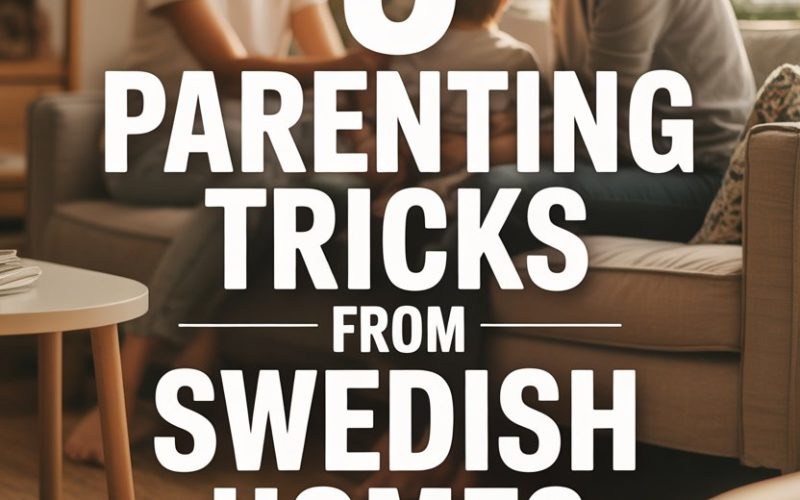Ever wondered how Swedes manage to raise relaxed, independent kids who actually eat their root vegetables, go to bed without negotiating like exhausted lawyers, and apparently love the outdoors?
While no country has a monopoly on perfect parenting, Sweden certainly has a few tricks up its very stylish sleeve. Busy parents everywhere have a lot to steal—er, lovingly borrow—from these Nordic homes.
Here are five Swedish parenting secrets you can try tonight—yes, even with your own wildlings.
1. Lagom Rules the Family
Forget extremes. In Sweden, everything circles back to “lagom,” a beloved concept meaning “just the right amount.” Too much screen time? Too little sugar?
Lagom says: find the sweet spot in between.
Swedish parents don’t chase after perfection, nor do they let their kids run wild through the meatball aisle at IKEA. Instead, they set boundaries that are clear but flexible, and expect everyone—including themselves—to keep things balanced.
You won’t find a national obsession with overscheduling; Swedish youngsters enjoy plenty of unstructured time. Soccer practice, piano lessons, birthday parties—sure, but not all in one day, and not every day of the week.
There’s a collective faith that kids don’t need to be constantly entertained or working toward their Nobel Prize by age seven.
And when it comes to treats? Swedish families embrace “lördagsgodis,” or Saturday Sweets. Instead of doling out goodies every time a child flashes those big, pleading eyes, sweets are saved for a special day.
This ritual not only gives kids something to look forward to, but it also takes the emotional charge out of sugar. Next time your little one demands a chocolate biscuit at 8 a.m., try declaring Saturday as the official treat day.
Watch as the drama drains out of dessert negotiations.
2. Outdoor Time, Every Day, No Matter the Weather
Swedish parents have a saying: “There’s no such thing as bad weather, only bad clothes.” Think of it as their polite way of saying, “Put on your wellies and get outside.”
Children in Sweden are bundled up and sent out to play in all seasons—rain, sleet, snow, the odd mosquito swarm. Preschools (or “förskolor”) even hold nap time outside under thick blankets in winter.
Why? Researchers have found that time in nature helps children develop emotional resilience, focus, and even stronger immune systems. The Swedes take this to heart; parkas and puddle suits are wardrobe musts from birth.
Start small: Take your kids for a walk, even if it’s drizzling. Skip the negotiations, the drama, the “But it’s cold!” monologue. A brisk fifteen minutes counts.
If you’re feeling brave, set up a backyard picnic or let them jump in muddy puddles, Peppa Pig style. Just keep the washing machine handy.
3. Foster Independence Early (Yes, Even With the Shoes)
Picture this: a three-year-old in Stockholm slowly, painstakingly putting on their own boots, while a parent waits patiently, sipping coffee.
No one’s rushing. No one’s swooping in.
Swedish parents believe deeply in “barns självständighet”—child independence. Kids are trusted to try things on their own, whether it’s getting dressed, making a simple snack, or walking to the corner shop with an older sibling.
It might take longer (especially when someone insists on wearing both left shoes), but it builds confidence and self-reliance.
A study on self-efficacy in Scandinavian children shows that encouraging kids to solve small daily challenges—like tying shoelaces or packing their lunch—pays off with greater resilience and problem-solving skills.
Next time your child fumbles through a task you could do faster, resist the urge to jump in. Give them a little more time, a little more space, and maybe a gentle reminder: “You’ve got this.”
4. Equality Starts at Home
Sweden consistently ranks near the top for gender equality, and that’s no accident. Swedish families share parenting duties more evenly than most.
Paternity leave is not just allowed, it’s expected; dads pushing prams on weekday mornings are a common sight. Children grow up seeing both parents cooking, cleaning, and caring.
This doesn’t just model fairness; it shapes future expectations. According to multiple studies, children raised in homes with shared domestic responsibilities are more empathetic, cooperative, and less likely to assign tasks according to gender.
The benefits spill over into all sorts of grownup things, from school projects to workplace dynamics.
Try a Swedish-style family meeting. List all the weekly chores—yes, even the mysterious items that seem to multiply in the laundry basket.
Let everyone (including the littlest) pick their share. Rotate the jobs every week.
If your partner has never wielded the vacuum, there’s no time like the present. Bonus: more hands on deck usually means more time for everyone to relax at the end of a long day.
5. Trust in Community
Raising kids in Sweden is not a solo sport. There’s a strong communal spirit that shows up everywhere from playgrounds to preschools.
Parents look out for each other’s kids. Neighbours organize group activities.
The legendary Swedish “fika”—that sacred coffee-and-cake break—often includes children, friends, and whoever else happens to pop by.
It’s more than just warm fuzzy feelings. Research shows that families with a strong sense of social support experience less stress and greater well-being.
Swedish parents rarely hesitate to ask for or offer help; it’s just part of the culture.
No need to move to Stockholm tomorrow. Start by borrowing a cup of sugar from the neighbour you always wave at, or offer to swap playdates with a parent from school.
Organize a casual afternoon tea, even if it’s just biscuits and juice. Allow your child to witness these little acts of connection.
The message: we’re all in this together.
A Little Bit Swedish, Right Where You Are
There’s no magic shortcut to raising calm, kind, independent children—unless you count sleeping through the night as magical (and honestly, who wouldn’t?).
Swedish families don’t have it all figured out, but their traditions offer a refreshing reminder: balance, fresh air, a little independence, fairness at home, and a strong sense of community can go a long way.
Try one or two of these ideas this week. You might find your child eating carrots without complaint. You might find yourself actually finishing a cup of coffee before it goes cold.
And if you start referring to your living room as a “lagom zone,” well—congratulations. You’re practically Swedish already.





